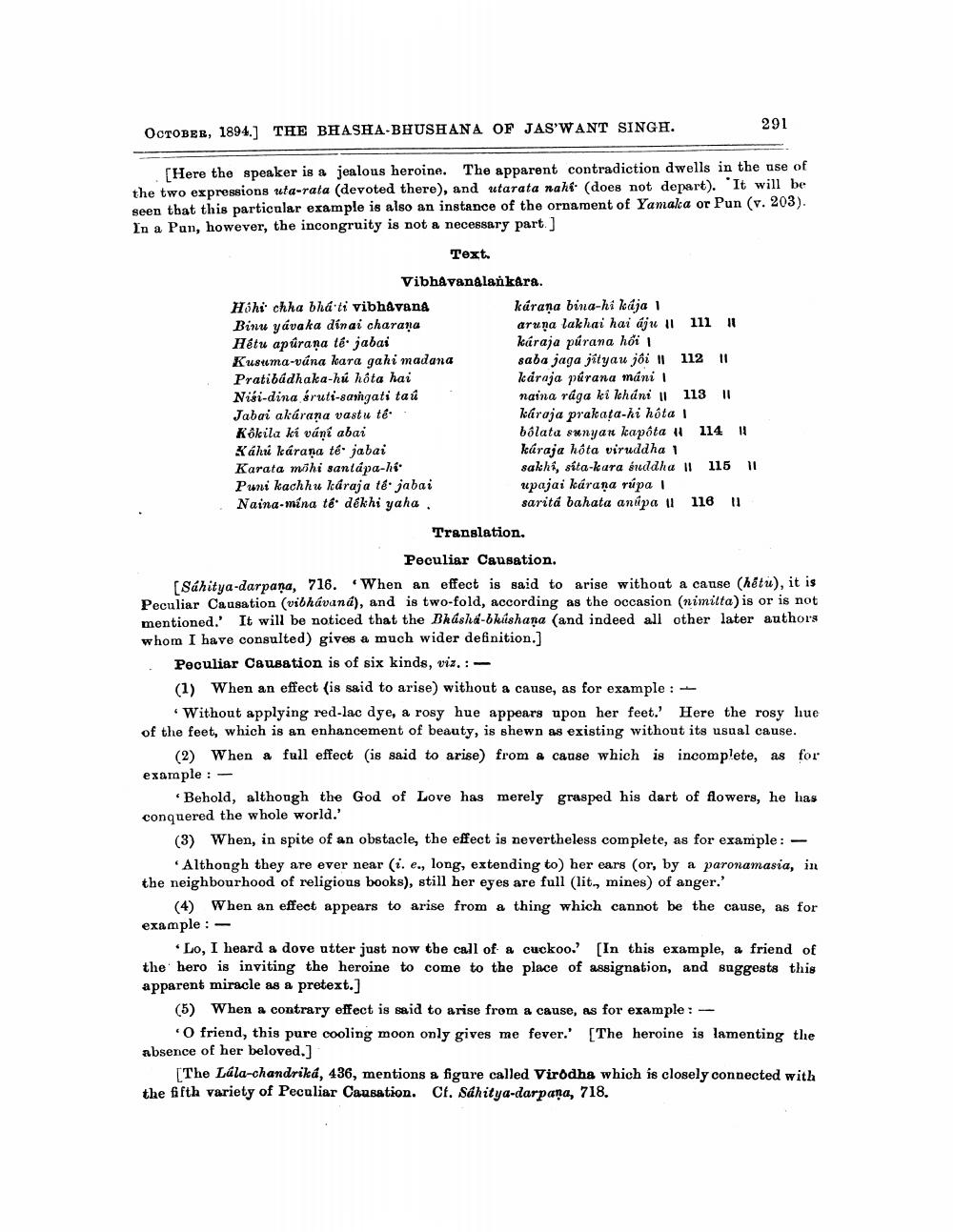________________
OCTOBER, 1894.] THE BHASHA-BHUSHANA OF JAS'WANT SINGH.
[Here the speaker is a jealous heroine. The apparent contradiction dwells in the use of the two expressions uta-rata (devoted there), and utarata nahi (does not depart). It will be seen that this particular example is also an instance of the ornament of Yamaka or Pun (v. 203). In a Pun, however, the incongruity is not a necessary part.]
Text.
Vibhavanalankara.
Hohi chha bhá ti vibhavana Binu yávaka dínai charana Hétu apúrana té• jabai Kusuma-vána kara gahi madana Pratibádhaka-hú hota hai Nisi-dina sruti-samgati taú Jabai akárana vastu té Kokila ki vání abai Káhú kárana té jabai Karata mohi santapa-hi Puni kachhu karaja te jabai Naina-mína té dékhi yaha.
kárana bina-hi kája 1
aruna lakhai hai aju | 111 | káraja púrana hoi
saba jaga jityau joi | 112 || karaja púrana máni naina raga ki khani | 113 karaja prakata-hi hota bolata sunyan kapota 114 karaja hóta viruddha 1 sakhi, sita-kara suddha 11 upajai karana rúpa saritá bahata anupa u 116 11
115 11
Translation.
11
291
11
Peculiar Causation.
[Sahitya-darpana, 716. When an effect is said to arise without a cause (hetu), it is Peculiar Causation (vibhávaná), and is two-fold, according as the occasion (nimitta) is or is not mentioned.' It will be noticed that the Bhúshá-bkúshana (and indeed all other later authors whom I have consulted) gives a much wider definition.]
Peculiar Causation is of six kinds, viz. :
(1) When an effect (is said to arise) without a cause, as for example: -
Without applying red-lac dye, a rosy hue appears upon her feet.' Here the rosy hue of the feet, which is an enhancement of beauty, is shewn as existing without its usual cause.
(2) When a full effect (is said to arise) from a cause which is incomplete, as for example: -
'Behold, although the God of Love has merely grasped his dart of flowers, he has conquered the whole world.'
(3) When, in spite of an obstacle, the effect is nevertheless complete, as for example: — 'Although they are ever near (i. e., long, extending to) her ears (or, by a paronamasia, in the neighbourhood of religious books), still her eyes are full (lit., mines) of anger.'
(4) When an effect appears to arise from a thing which cannot be the cause, as for example:
* Lo, I heard a dove utter just now the call of a cuckoo.' [In this example, a friend of the hero is inviting the heroine to come to the place of assignation, and suggests this apparent miracle as a pretext.]
(5) When a contrary effect is said to arise from a cause, as for example: -
O friend, this pure cooling moon only gives me fever.' [The heroine is lamenting the absence of her beloved.]
[The Lala-chandrika, 436, mentions a figure called Virodha which is closely connected with the fifth variety of Peculiar Causation. Cf. Sahitya-darpana, 718.




